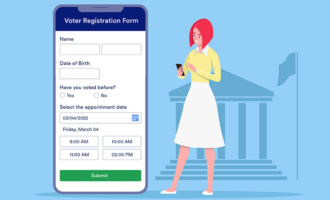Processing and managing records and documents are key elements of operating any government department. Departments need a defined, efficient, and accurate record management process to avoid lost data, operational errors, and other potential problems. Building a solid record management process all starts with a quality, modernized record management approach.
What is record management?
Record management refers to a system overseeing the creation, use, storage, and eventual disposition of records. In previous decades, a records management process might involve filling out paper copies of documents, entering key information from the documents into a database or spreadsheet, storing the documents in a filing cabinet or other physical storage space, and then shredding the documents when they were no longer needed.
Today, records management has become an electronic process. Records are housed digitally, often in the cloud, and there’s no longer a need for physical records storage.
What are the benefits of electronic records management?
Electronic records management systems offer other benefits that have prompted many departments to adopt them. Here are a few.
Efficiency
When you digitally collect records, that information can automatically feed into spreadsheets and databases, saving staff the time of manually entering the information. There’s no need to worry about scanning documents, and you can store the records automatically. The entire system is more efficient than working with hard copies of documents, and since your staff won’t have to focus on repetitive tasks, they’ll have more time to complete other, more important tasks that need their attention.
With many digital records systems, you can create custom workflows, assigning tasks to certain team members. You might assign someone on your fiscal team the responsibility of reviewing and approving the invoices you receive, or an HR staff member might need to review and approve timesheets. When you assign these tasks digitally, the staff members will receive notifications when a document needs their attention, saving time and allowing them to focus on their work.
Increased accuracy
Since digital record management eliminates the need for team members to process and manually record information from documents, it helps eliminate human errors. Your data is more accurate as a result.
Professionalism
Presenting clients and vendors with digital records or invoices demonstrates that your department keeps pace with modern technology. It can make a good impression on clients and vendors and may encourage them to view your department as more trustworthy and professional.
Enhanced search capabilities
When your data is digitally recorded, it’s easier to locate the individual records you need. Many data management systems allow you to search records by keyword, client name, date, and other criteria, so you can more easily find a particular record. This is a major advantage when you need to verify an invoice, a contract, or another type of record — you won’t waste any time searching through paper records in a filing cabinet.
Reduced physical storage needs
Maintaining physical space is expensive. Transitioning to a digital records management system may mean that you’re able to stop renting a storage unit or that you can transform your records storage room into a much-needed office or other space.
Increased record safety
Floods, fires, and other potential disasters can threaten the safety of your physical records. Storing the records digitally can help eliminate that risk. By choosing a record management system with advanced security, you can better protect your records than you can when dealing with physical copies.
Many records management systems also allow you to selectively grant staff access to records. That capability is ideal when you’re working with sensitive information and want to limit the number of staff members who can access that information.
What can help ease the transition to digital record management?
Making the transition to digital record management can be an excellent way to enhance your department’s productivity, save time, increase document accuracy, and more. Jotform Enterprise is a highly versatile platform that can ease that transition process.
With Jotform Enterprise, you can enjoy a whole suite of no-code solutions and administrative controls — from forms and tables to apps and approval workflows. More than 300 integrations with third-party apps mean that Jotform Enterprise can easily become an element of your daily workflow. You can build apps and customize your workflows to meet your department’s specific needs.
If you’ve already been building forms with Jotform, you can migrate those forms over — there’s no need to rebuild them. You’ll enjoy security that meets the highest industry standards, including databases with 256-bit SSL encryption and payment transactions that meet PCI DSS Level I requirements. Plus, a dedicated support team is available to help you with the transition process, so you’ll have all of the support you need as you transfer over to digital record management.
Photo by Gustavo Fring





























Send Comment: